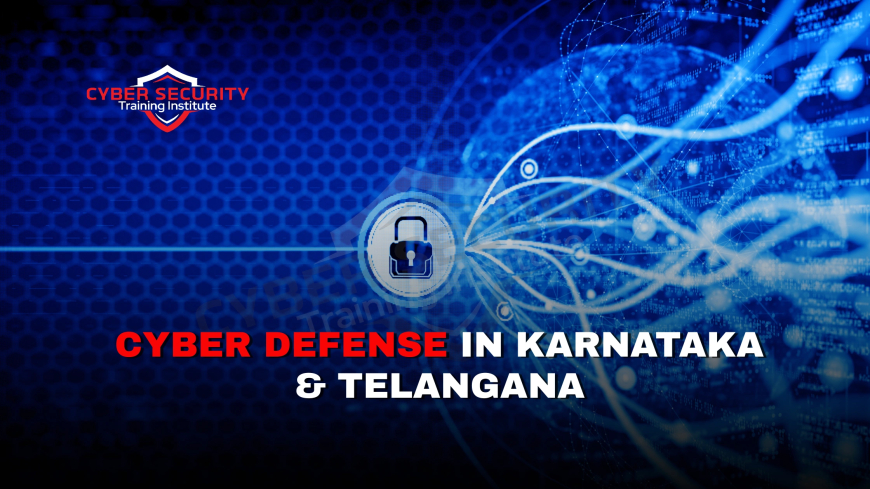South India’s Cyber Wall | How Karnataka and Telangana Stay Ahead of Threats
In today’s digital age, where our lives are intertwined with technology, the threat of cyberattacks looms large. From phishing scams to ransomware, cybercriminals are constantly finding new ways to exploit vulnerabilities. But in South India, two states—Karnataka and Telangana—are building a formidable defense, often referred to as the "Cyber Wall." These states, home to India’s tech giants and innovation hubs, are leading the charge in cybersecurity, setting an example for the rest of the country. This blog explores how Karnataka and Telangana are staying ahead of cyber threats, making their digital landscapes safer for businesses, governments, and individuals alike.

Table of Contents
- Why Cybersecurity Matters in South India
- Karnataka’s Cybersecurity Ecosystem
- Telangana’s Proactive Approach
- Key Strategies Driving Success
- Comparing Karnataka and Telangana’s Cybersecurity Initiatives
- Challenges and the Road Ahead
- Conclusion
- Frequently Asked Questions
Why Cybersecurity Matters in South India
South India, particularly Karnataka and Telangana, is the heartbeat of India’s IT industry. Bengaluru, often called the "Silicon Valley of India," and Hyderabad, a rising tech powerhouse, host thousands of tech companies, startups, and global corporations. These cities drive innovation in software, artificial intelligence, and cloud computing, but they also attract cybercriminals looking to exploit sensitive data and intellectual property.
Cyberattacks can disrupt businesses, steal personal information, and even threaten national security. For example, ransomware attacks, where hackers lock critical systems and demand payment, have targeted hospitals, banks, and government agencies. In 2022, a major medical institution in India faced a ransomware attack, highlighting the real-world impact of cyber threats. Karnataka and Telangana, aware of these risks, are investing heavily in cybersecurity to protect their digital economies.
By fostering collaboration between governments, private companies, and academic institutions, these states are creating robust systems to detect, prevent, and respond to cyber threats. Their efforts are not just about protecting businesses but also about ensuring trust in digital services for everyday citizens.
Karnataka’s Cybersecurity Ecosystem
Karnataka, with Bengaluru at its core, is a global IT hub. The state hosts major tech firms like Infosys, Wipro, and international giants like Google and Microsoft. This concentration of tech activity makes Karnataka a prime target for cyberattacks, but it also drives innovation in cybersecurity.
- Cybersecurity Centre of Excellence (CoE): Karnataka established a Cybersecurity Centre of Excellence in Bengaluru, a joint initiative by the state government and industry partners like the Data Security Council of India (DSCI). The CoE focuses on research, training, and developing cutting-edge cybersecurity solutions.
- Startup Ecosystem: Bengaluru is home to numerous cybersecurity startups, such as CyRAACS and Brisk Infosec, which provide tailored solutions for businesses. These startups work on everything from malware detection to data privacy.
- Government Initiatives: The Karnataka government has launched policies to promote cybersecurity awareness. Programs like the Cyber Surakshit Bharat initiative educate businesses and individuals about safe online practices.
- Skilled Workforce: Bengaluru’s universities and training institutes offer specialized courses in cybersecurity, producing a steady stream of professionals to tackle emerging threats.
These efforts make Karnataka a leader in cybersecurity innovation, with a focus on staying one step ahead of cybercriminals.
Telangana’s Proactive Approach
Telangana, with Hyderabad as its capital, is another powerhouse in India’s tech landscape. Known for its forward-thinking policies, Telangana is building a strong cybersecurity framework to protect its growing digital infrastructure.
- Cybersecurity Centre of Excellence in Hyderabad: Telangana’s CoE, established in collaboration with DSCI, focuses on fostering innovation and supporting cybersecurity startups. It also works on policy formulation, such as the National Cybersecurity Policy 2020.
- Telangana Police Cybercrime Unit: The state’s police force has a dedicated cybercrime unit that investigates online fraud, phishing, and other digital crimes. They also conduct awareness campaigns to educate citizens.
- Public-Private Partnerships: Telangana encourages collaboration between government agencies, tech companies, and academia to share threat intelligence and develop solutions. For example, partnerships with companies like Microsoft enhance the state’s cybersecurity capabilities.
- Focus on Emerging Technologies: Telangana is investing in AI and machine learning to detect and respond to cyber threats in real time, making its defenses more proactive.
Telangana’s approach combines technology, law enforcement, and education to create a secure digital environment.
Key Strategies Driving Success
Both Karnataka and Telangana employ a range of strategies to stay ahead of cyber threats. These strategies are designed to be accessible and effective, even for those new to cybersecurity.
- Regular Security Audits: Companies and government agencies in both states conduct periodic audits to identify weaknesses in their systems. This helps them fix vulnerabilities before hackers can exploit them.
- User Education: Both states run campaigns to teach people about phishing, strong passwords, and safe internet practices. For example, avoiding suspicious emails or links can prevent many attacks.
- Zero-Trust Architecture: This approach assumes no user or device is automatically trustworthy, requiring verification for every access attempt. It’s like double-checking the identity of anyone entering a secure building.
- Incident Response Plans: Both states have frameworks to quickly respond to cyberattacks, minimizing damage. This includes isolating affected systems and notifying authorities.
- Collaboration: By working with global organizations like Interpol and local bodies like CERT-In, Karnataka and Telangana stay updated on the latest threats and best practices.
These strategies ensure that both states are prepared for current and future cyber challenges.
Comparing Karnataka and Telangana’s Cybersecurity Initiatives
| Aspect | Karnataka | Telangana |
|---|---|---|
| Cybersecurity Centre of Excellence | Located in Bengaluru, focuses on research and training | Located in Hyderabad, emphasizes startups and policy |
| Key Government Initiatives | Cyber Surakshit Bharat, awareness campaigns | Cybercrime unit, National Cybersecurity Policy support |
| Private Sector Involvement | Infosys, Wipro, cybersecurity startups | Microsoft, TCS, startup ecosystem |
| Focus on Emerging Tech | AI, cloud security | AI, machine learning for threat detection |
| Workforce Development | Universities, training institutes | Partnerships with academia, skill programs |
Challenges and the Road Ahead
Despite their progress, Karnataka and Telangana face challenges in maintaining their cyber defenses:
- Lack of Awareness: Many individuals and small businesses lack knowledge about basic cybersecurity practices, making them easy targets.
- Evolving Threats: Cybercriminals are constantly developing new techniques, such as AI-powered attacks, which require continuous adaptation.
- Resource Constraints: Smaller organizations may lack the budget or expertise to implement robust cybersecurity measures.
- Cross-Border Threats: Cyberattacks often originate outside India, making it hard to track and prosecute criminals.
To address these challenges, both states are investing in education, international cooperation, and affordable cybersecurity solutions for smaller businesses. The road ahead involves scaling up these efforts and ensuring that every citizen and organization can contribute to a secure digital ecosystem.
Conclusion
Karnataka and Telangana are setting a high standard for cybersecurity in India, creating a "Cyber Wall" that protects their digital economies and citizens. Through their Centres of Excellence, proactive government policies, and strong private-sector involvement, these states are tackling cyber threats head-on. Their strategies—ranging from user education to zero-trust architecture—offer a blueprint for others to follow. While challenges like evolving threats and limited awareness remain, the commitment of Karnataka and Telangana to innovation and collaboration ensures they will continue to lead the way. By staying vigilant and adaptive, these states are not just defending their own digital landscapes but also contributing to a safer cyberspace for all of India.
Frequently Asked Questions
What is cybersecurity?
Cybersecurity is the practice of protecting digital systems, networks, and data from unauthorized access, attacks, or theft.
Why are Karnataka and Telangana leaders in cybersecurity?
Both states are home to major tech hubs (Bengaluru and Hyderabad) and have invested in Centres of Excellence, government initiatives, and private-sector partnerships to combat cyber threats.
What is a ransomware attack?
A ransomware attack involves hackers locking a system or data and demanding payment to unlock it, often causing significant disruption.
How does phishing work?
Phishing involves cybercriminals sending fake emails or messages that appear legitimate to trick users into sharing sensitive information like passwords or bank details.
What is a zero-trust architecture?
Zero-trust architecture assumes no user or device is trustworthy by default, requiring verification for every access attempt to enhance security.
What role does the government play in cybersecurity?
Governments in Karnataka and Telangana run awareness campaigns, establish policies, and support Centres of Excellence to strengthen cybersecurity.
What is the Cybersecurity Centre of Excellence?
It’s a collaborative hub in Bengaluru and Hyderabad that focuses on research, training, and developing cybersecurity solutions.
How do startups contribute to cybersecurity?
Cybersecurity startups in Karnataka and Telangana create innovative tools for malware detection, data protection, and threat response.
What is the Cyber Surakshit Bharat initiative?
It’s a government program to raise awareness about cybercrimes and promote safe online practices among businesses and individuals.
Why are cyberattacks increasing in India?
Rapid digitalization, increased internet usage, and valuable data in tech hubs like Bengaluru and Hyderabad attract cybercriminals.
How does Telangana’s cybercrime unit work?
The unit investigates online crimes, conducts awareness campaigns, and collaborates with tech companies to track and prevent cyber threats.
What is a security audit?
A security audit is a review of systems and networks to identify vulnerabilities that could be exploited by cybercriminals.
How can individuals protect themselves online?
Use strong passwords, enable two-factor authentication, avoid suspicious links, and keep software updated to stay safe.
What is two-factor authentication?
It’s an extra layer of security requiring two forms of verification, like a password and a code sent to your phone, to access an account.
Why is AI important in cybersecurity?
AI helps detect threats in real time, analyze patterns, and respond to cyberattacks faster than traditional methods.
What are insider threats?
Insider threats occur when employees or trusted individuals misuse access to sensitive data for malicious purposes.
How do Karnataka and Telangana collaborate globally?
They work with organizations like Interpol and CERT-In to share threat intelligence and adopt global best practices.
What challenges do these states face in cybersecurity?
Challenges include lack of awareness, evolving threats, resource constraints, and cross-border cyberattacks.
How can small businesses improve cybersecurity?
Small businesses can conduct audits, train employees, use strong passwords, and invest in affordable cybersecurity tools.
What’s the future of cybersecurity in South India?
The future involves more AI-driven solutions, increased education, and stronger public-private partnerships to combat evolving threats.
What's Your Reaction?
 Like
0
Like
0
 Dislike
0
Dislike
0
 Love
0
Love
0
 Funny
0
Funny
0
 Angry
0
Angry
0
 Sad
0
Sad
0
 Wow
0
Wow
0













